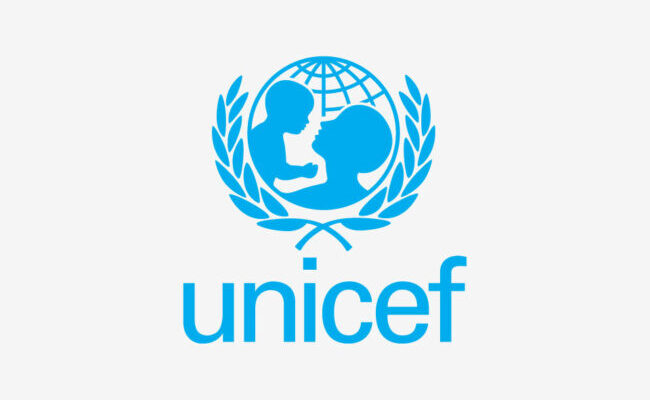
United Nations Children’s Fund (UNICEF) has stressed that issues confronting households in Nigeria where Children’s lives are complex, require a multidimensional approach to be addressed.
UNICEF added that while working to improve the lives of children, government and other stakeholders must understand that the multi-dimensional approach must be carefully applied in accordance with the world’s best practices of child upbringing.

The assertion was made by the Officer in Charge of the Bauchi Field Office of UNICEF, Dr Clement Adams, while fielding questions from Journalists during the 2023 end-of-year review meeting organized for States covered by the Bauchi Field Office, held at the Conference Room of Emeralds Hotel, Gombe.
He therefore called on governments and stakeholders in Nigeria to take a fresh approach to tackling and addressing such challenges in order to improve the lives of children for a better Nigeria.
Clement Adams said, “All issues that are confronting households are multidimensional. The same house that needs health services, the same house needs nutrition, the same house needs water and sanitation, the same house needs agriculture, they need everything. So, how are we implementing things holistically, multisectorally?”.
The UNICEF Bauchi Field Office OIC explained that UNICEF has been working to identify methods and approaches that will work in tackling the identified challenges to encourage the government to scale up and expand such methods for better and more impactful results.
He stressed, “What UNICEF is trying to do, is to show the government what works, because we do not have the funding required to do the needed higher coverage, but we have the funding to identify and show what will work and what is the best approach.”
“If we are able to do that, we will then build on advocacy so that the government will expand. One of the critical things, is to know what will work. If we get that right by knowing what works, I don’t think we will be having much challenges,” he assured.
He also said, “However, getting the government to scale up the methods and approach that works is another thing we need to work hard on, there are several things that come along with getting the government to scale up. Part of it is funding. The second part of it is the political will. The third part is about capacities.”
Clement Adams further said that there is need for a strengthened Monitoring and Evaluation framework for better results and optimum impact of intervention programmes and efforts across the thematic areas.
According to him, “In planning activities and initiatives, you have to put your efforts into the things that work. However, the things that show and prove that your interventions are working are monitoring and evaluation.”
He stressed, “So, you need to also put a good monitoring and evaluation system in place as part of the planning process because one of the things lacking in the government systems is adding M&E into planning and consistently following to see if it is actually working.”
Clement Adams stated that the challenges being experienced around the world, especially in Nigeria and states of the UNICEF’s Bauchi Field Office require all actors to embrace a holistic and multidimensional approach to ensure a better outcome and impact on the lives of children.
“We need to be holistic in implementing things; our approach needs to be implemented multisectoral because if we do not do that we will not achieve the desired results. Water and sanitation have a very good correlation and impact on health and nutrition, and education has a very high impact on service adaptation. So all they must go hand in hand,” he added.
The OIC then stressed that “Having health working in isolation from water and sanitation as well as education will not give us the needed results. Every actor needs to be invited to the table and work for a common goal because they have a stake in achieving meaningful results.”
Clement Adams explained that the end-of-the-year review meeting had representatives and other stakeholders from Bauchi, Gombe, Adamawa, Taraba, and Plateau states which are covered by the Bauchi Field Office.
The meeting was to review the progress made in the different areas of UNICEF’s work in the Bauchi Field Office during which the participants discussed the successes and challenges faced in the different programmes and initiatives implemented by UNICEF.
He then explained that the review meeting was a reminder of the importance of collaboration and partnership in achieving UNICEF’s goals of ensuring a better future for children.
He disclosed that with the continued support from UNICEF and cooperation from all stakeholders, the States within the Bauchi Field Office were able to achieve a lot and make positive impact on the lives of the most vulnerable children and families in the year under review.
He, however, noted that a lot needs to be done to address challenges being faced by children in the region, especially the issues of poverty, water and hygiene as well as access to education and health.
He also acknowledged that the challenges cannot be fully addressed by a single approach, instead, a multidimensional approach is necessary.
He said that the government and other stakeholders must understand that children’s needs are interconnected and require a comprehensive response that addresses various sectors, including health, education, environment water, sanitation and hygiene as well as protection.
According to him, “Going forward, we need to develop an approach that recognizes such to be able to tackle such issues affecting children.”
Clement Adams added that the data from the review had uncovered the need for better and strengthened monitoring and evaluation to measure the impact and successes of various intervention programmes and initiatives.
He emphasized that monitoring and evaluation serve as important tools to track progress, identify gaps and adjust strategies to ensure better outcomes for children.
The OIC further revealed that the team recorded significant progress in terms of the formulation of policies and other initiatives as well as implementation to address the critical and diverse challenges facing children, stressing: “It is a call to action for governments.”
He added that the review meeting has provided a platform for the team to have a better plan and work more towards creating a better future for every child.
He commended the collaborative relationship among the States and UNICEF over the years saying that it has been a positive and impactful relationship which has improved on the lives of women and children.
Clement Adams stressed that all the working partners have a positive attitude towards the success of the various interventions aimed at making lives better for women and children through unlocking the areas of difficulties.
He however stressed the need for strengthening birth registration which will give near-perfect planning for child welfare with accurate data on births and deaths of children.
Clement Adams then assured that the meeting was a way of planning for what was to be done in the 2024 year for improved deliveries for women and children in terms of healthcare, education, nutrition and other issues.
READ ALSO FROM NIGERIAN TRIBUNE







